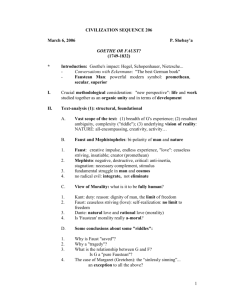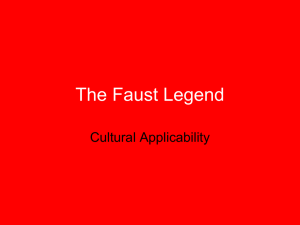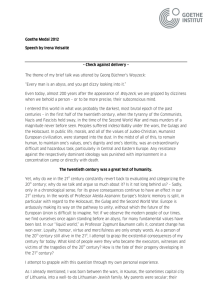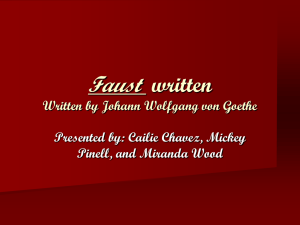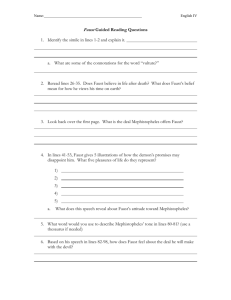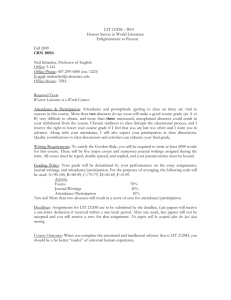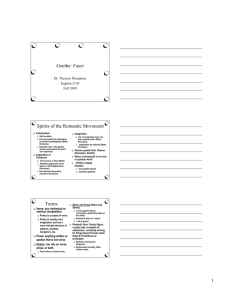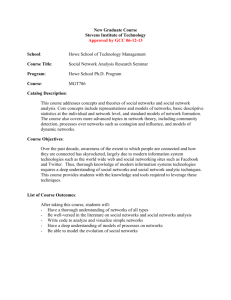IB ENG
advertisement
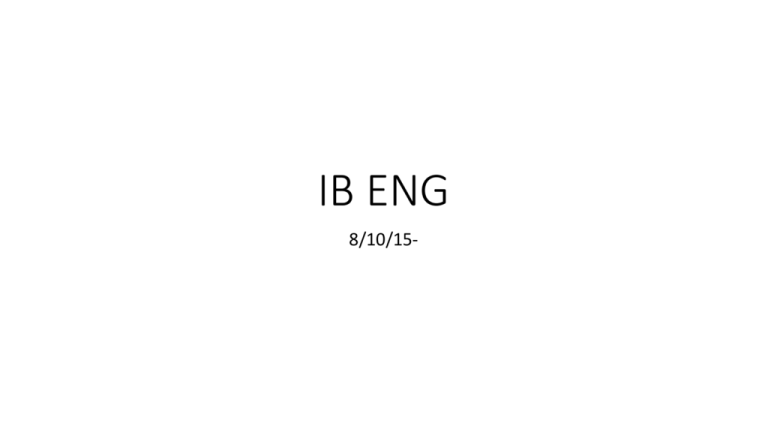
IB ENG 8/10/15- Romanticism and Satire (8/10-11) • Define Romanticism • Define Satire • Which do you prefer? If you were to rank yourself on a spectrum between the romantic and satiric, where would you fall? Why? Don Quixote Characterization (8/12-13) • How relatable are the characters in the book Don Quixote? What details does Cervantes include which make them feel true to life? (give examples) • Do the characters react authentically to their situation? Do they grow? Explain and support your answer. • Which characters do you like the most in the story? Why? What makes you like them? • If you were to write a story, how would you develop characters to make them believable to the reader? Be specific and include examples of details you might include. Hester and Dimmesdale 8/14 • Hester and Dimmesdale both committed the same sin, but respond to it very differently. How are their consequences different? How is their response to guilt different? How is their self-image different? • If they could somehow have ended up in opposite positions, with Dimmesdale held responsible and Hester let off without anyone knowing, how would the story have been different? How would their personalities have fit those opposite roles? • Watch the clip from the series CTRL. Lizzie and Stuart have different opinions about past mistakes. How do their ideas apply to Hester and Dimmesdale? Who do you side with, Lizzie or Stuart? Read the passage from page 31 (8/19-20) • “Perhaps there was a more real torture in her first unattended footsteps from the threshold of the prison, than even in the procession and spectacle that have been described, where she was made the common infamy, at which all mankind was summoned to point its finger. Then, she was supported by an unnatural tension of the nerves, and by all the combative energy of her character, which enabled her to convert the scene into a kind of lurid triumph. It was, moreover, a separate and insulated event, to occur but once in her lifetime, and to meet which, therefore, reckless of economy, she might call up the vital strength that would have sufficed for many quiet years. The very law that condemned her—a giant of stern features, but with vigor to support, as well as to annihilate, in his iron arm— had held her up, through the terrible ordeal of her ignominy. But now, with this unattended walk from her prison-door, began the daily custom, and she must either sustain and carry it forward by the ordinary resources of her nature, or sink beneath it. She could no longer borrow from the future, to help her through the present grief. To-morrow would bring its own trial with it; so would the next day, and so would the next; each its own trial, and yet the very same that was now so unutterably grievous to be borne.” Questions over the passage • Why is the experience of being released from prison in some ways harder for Hester than being publicly shamed? • How does the moment add to Hester’s character and our sympathy for Hester? Provide evidence. • Have you ever had an experience which you normally would have doubted your ability to perform, but by nature of its being short, you found you could do it? Explain how time and timing influence your ability to perform difficult tasks. “Mood to Burn Bridges” • In what ways is the speaker in this song similar to Hester? In what ways is she different? Give evidence. • How does the speaker’s tone underscore the hypocrisy of the town around her? In what ways is this similar to the Puritan community within the Scarlet Letter? Give evidence from both texts. • In what ways does the media change the way the story is told? Which did you personally find more engaging? Why? Pick out specific elements that influenced you and discuss their influence. • Have you ever felt that you were called out on something that everyone else was getting away with? How would such a situation influence your ability to build relationships with others? Would you be affected the same way the speaker and Hester were? Pros and Cons 8/26-27 • What are some of the strengths of Romanticism? • What are some of the weaknesses? What do these symbols have to do with the term “gothic”? What words do you associate with “gothic”? Look at page 12-13 of Faust. 8/31-9/1 • How is Faust characterized on these pages? What traits does he seem to have? How do you know? • Faust is an early and excellent example of Romanticism. Given what you know about Romanticism, what characteristics of Romantic literature do you see on these pages? Give examples. • How was Faust’s problem in these pages hinted at in the prologue in heaven? Compare Mephisto’s description of Faust on page 10 to what we actually see of Faust on these pages. Give evidence. • First impressions are important. How do you feel about the story of Faust based upon your first impressions of him? Look at the conversations on pages 24-25. 9/2-4 • List as many topics of conversation as you see. • List as many types of people that you see. • Why would Goethe interrupt the progress of his story for two and a half pages of irrelevant dialogue? What is the significance of this portion of the scene? What does it accomplish in the scope of the story? • Consider what kinds of conversations you have around the lunch table or in the halls. What purpose do most of those conversations have? What do they reveal about you and your friends? Pick a few things you’ve talked about to someone in the last few days and discuss what it reveals about your goals and priorities in life, even if they conversation was relatively simple or asinine (such as VMA performances). Look at page 34 9/8-9 • Why is Faust dissatisfied with the original text? What does he finally settle upon? • Why does Faust feel comfortable with changing the Bible? What does this show about him? • Look at the four words Faust chooses (Word, Sense, Force, Deed). What does each represent to Faust? What are the problems with the first 3? What does the progression through the four show about Faust’s quest for meaning? • What is real and true? Where does true meaning lie? How do you define truth? Look at the terms of the deal on pages 44-45. 9/10-11 • What does Mephistopheles offer? Why isn’t this good enough for Faust? • What does Faust ask for instead? What does Faust truly want? • This is one of the most famous passages in western literature. Why? What makes Faust worth reading? What makes it resonant with humanity? • What is your own greatest desire? What would you give for this? Look at the interpretive note on page 369. 9/14-15 • • • • What is the historical significance of this tavern? In what ways was it associated with the Faust legend in Goethe’s day? What does Goethe change about the legend here? What does he keep the same? Why? What would be the purpose of including this scene in his story if he is going to change it so much? What does it accomplish here? If you were to rewrite the story of Faust and put your own spin on it, what scene would you keep? What would you focus on? How would you change the plot and characters? Why? Faust: Kitchen and Street 9/16-17 • Does the Faust of the Witch’s Kitchen scene seem to be the same as the Faust of the Street scene? What causes his response to Gretchen in the street scene? Give evidence. • What do the Marmosets in the Kitchen scene mean? What do they accomplish in the text? Why little animals? What is the significance of the image in the mirror? How does it affect Faust? Give evidence. How important is youth? What’s your opinion? How does age affect one’s personality? • • Clean Little Room 9/18 • Summarize the story of the King of Thule from Gretchen’s song. What does her interest in the song show about her character? Does it in any way relate to her relationship with Faust? What does this insight into her character foreshadow? • What is significant about the context of this song? Why is it done while she’s changing clothes? How is this context significant to characterization and action? • The book introduced Faust through scenes filled with long monologues and deeply discussed ideas. However, Gretchen’s characterization is done significantly through action. Why do you think Goethe does this? How does it influence our perception of the characters? Give evidence. • Because this is a play, the choices of the actors and directors can influence the way this scene is portrayed. If you were directing the action in the scene, what would you say to the actor playing Gretchen in order to convey her character clearly? Quiz • What two pieces of furniture does Faust look at in Gretchen’s room? • Where do they leave the present? • What special object does the King of Thule prize above all else? • What is in the box Gretchen finds? • Where does the present end up according to Mephistopheles? Ron Pearlman • Watch the clip and listen to actor Ron Pearlman’s comments on his make up in this scene. What does his insistence show about the acting process and the way the actor creates character? How does his choice here relate to the conclusions you drew about Gretchen? Reflect on how much thought goes into imagery and characterization in a work. Be sure to reference both Pearlman’s comments and the text. Group Activity • After you receive all of these instructions, you’ll break into your Marmoset groups. • You will pick up a copy of the passage from Cymbeline in which Iachimo investigates Immogen’s room. • Together you will reread the passage and the scene from Faust in which Faust investigates Gretchen’s room (p 74-75, lines 2687-2728). • Goal: Identify whether or not Goethe was influenced by Shakespeare when writing this scene. Group Instructions, continued • After examining both scenes you will conclude that the scene is one of the following: • Clearly influenced by Shakespeare’s Cymbeline • Feasibly influenced by Shakespeare’s Cymbeline • Unlikely influenced by Shakespeare’s Cymbeline Group Instructions, continued • Make a list of evidence for your conclusion: • Solid Evidence: textual similarity, clear structural similarity, exact diction • Circumstantial Evidence: Similar characterization, theme, symbolism, structure (loose), etc. GO! • Passage Keepers may now pick up texts and Recorders prep your materials. Closing Reflection • Reflect on the group work experience. Consider the following: • How did you come to your conclusion in your group activity? How was your process? Did you feel you examined the passages completely and thoroughly? Do you feel confident in your answer? Why? If you were to do a similar assignment, would you structure it differently? How would you approach it differently? What is Truth? • Mephisto and Faust argue about what constitutes the truth and what makes a lie in the second street scene. How does Faust define truth? What is the line between truth and falsehood? What is the example they use? How does this tie into his personality and Romanticism? Gretchen’s past and characterization • • • • Is Gretchen “grown up”? What evidence do we have for her maturity? For her childishness? What does it mean to be mature? What is the significance of Gretchen’s little sister? How would an experience like that influence a person? What does this say about Gretchen’s character? Explain with evidence. Edna St. Vincent Millay’s poem “Childhood is a Kingdom Where Nobody Dies” says that maturity and adulthood come from understanding death. Does this seem to apply to Gretchen? Explain. What is your personal definition of adulthood?
